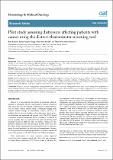Files in this item
Pilot study assessing distressors affecting patients with cancer using the distress thermometer screening tool
Item metadata
| dc.contributor.author | Yamout, Rana | |
| dc.contributor.author | Aragon-Ching, Jeanny | |
| dc.contributor.author | Abed Al Ahad, Mary | |
| dc.contributor.author | Taher, Ali | |
| dc.contributor.author | Finianos, Antoine | |
| dc.date.accessioned | 2020-10-27T16:56:52Z | |
| dc.date.available | 2020-10-27T16:56:52Z | |
| dc.date.issued | 2020-06-22 | |
| dc.identifier | 270866159 | |
| dc.identifier | c6c6f44f-9c15-4d12-8aaf-3661a25df6ea | |
| dc.identifier.citation | Yamout , R , Aragon-Ching , J , Abed Al Ahad , M , Taher , A & Finianos , A 2020 , ' Pilot study assessing distressors affecting patients with cancer using the distress thermometer screening tool ' , Hematology and Medical Oncology , vol. 5 , no. 3 , pp. 1-5 . https://doi.org/10.15761/HMO.1000211 | en |
| dc.identifier.issn | 2398-8495 | |
| dc.identifier.other | ORCID: /0000-0002-9006-730X/work/82501123 | |
| dc.identifier.uri | https://hdl.handle.net/10023/20831 | |
| dc.description.abstract | Background : Distress is an inevitable and debilitating emotion experienced by those with cancer that has been shown to impact quality of life (QOL) and overall survival. It can manifest from emotional, physical, spiritual, or psychiatric stressors. We sought to determine the prevalence of distress during initiation of chemotherapy for cancer in the George Washington Medical Center, Washington D.C. Methods : The distress screening thermometer results were retrospectively evaluated from a single institution from patients who attended outpatient office clinic visits in an urban institution from 2014 – 2015 using the Distress Thermometer/Problem list (DT/PL) version 3.2012. Pearson’s correlation coefficient was used to examine correlation between the scores of each problem area. Multivariate linear regression models were used to examine the association between the overall distress thermometer score and each of the five problem areas. One-way Anova tests were conducted to examine whether the mean distress score and the mean of each problem varied significantly between the cancer types. Results : Females comprised 61.2% of the study sample and the mean age of the sample was 60. The mean distress score was 3.6 (SD= 3.0). The strongest correlation between the various problem areas was found between emotional and practical problems (correlation coefficient = 0.38 followed by a correlation of 0.30 between practical and family problems. The highest mean distress score (4.91) was observed in lung cancer patients while the lowest (2.56) was found in genitourinary cancer patients; however, the difference in the mean of distress scores between the cancer types was not significant (p= 0.107). Conclusions : Distress is common among patients starting chemotherapy. Distress scores differ among various cancer types and also among various population of patients making it difficult to extrapolate data about distress from one population to another. Every institution is encouraged to study distress in its cancer population in order to understand the various parameters contributing to such distress thus helping these institutions implement a multidisciplinary distress screening program that help identify those patients in need of further evaluation and management. | |
| dc.format.extent | 5 | |
| dc.format.extent | 751338 | |
| dc.language.iso | eng | |
| dc.relation.ispartof | Hematology and Medical Oncology | en |
| dc.subject | Distress | en |
| dc.subject | Cancer | en |
| dc.subject | NCCN Distress thermometer/Problem list | en |
| dc.subject | Psychosocial | en |
| dc.subject | RC0254 Neoplasms. Tumors. Oncology (including Cancer) | en |
| dc.subject | RA0421 Public health. Hygiene. Preventive Medicine | en |
| dc.subject | NDAS | en |
| dc.subject | SDG 3 - Good Health and Well-being | en |
| dc.subject.lcc | RC0254 | en |
| dc.subject.lcc | RA0421 | en |
| dc.title | Pilot study assessing distressors affecting patients with cancer using the distress thermometer screening tool | en |
| dc.type | Journal item | en |
| dc.contributor.institution | University of St Andrews. School of Geography & Sustainable Development | en |
| dc.contributor.institution | University of St Andrews. Population and Health Research | en |
| dc.identifier.doi | 10.15761/HMO.1000211 | |
| dc.description.status | Peer reviewed | en |
| dc.identifier.url | https://www.oatext.com/pilot-study-assessing-distressors-affecting-patients-with-cancer-using-the-distress-thermometer-screening-tool.php#Article | en |
This item appears in the following Collection(s)
Items in the St Andrews Research Repository are protected by copyright, with all rights reserved, unless otherwise indicated.

